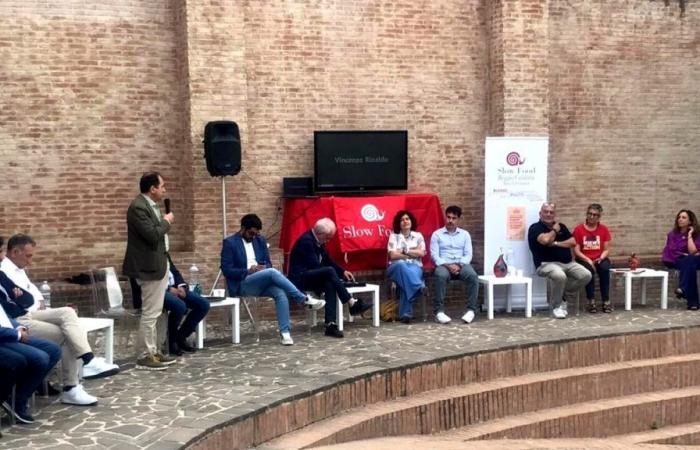In the charming village of Seminara, one of the municipalities of the metropolitan city of Reggio Calabria, which in the panorama of terracotta processing in Calabria represents a true center of art, the Guide to extra virgin olive oils published from Slow Food which this year has the subtitle: how to choose and find a good extra virgin olive oil.
The event dedicated to “good, clean and fair” Calabrian oil took place right in the village of the “pignatari masters” where some workshops are still active, where the clay is worked according to the most ancient tradition, with few tools and a lot of creativity. For twenty-four years, the Oil Guide has been an important tool for orienting yourself in Italian olive production and knowing how to choose the right product to bring to the table.
A tool that allows the reader to immerse themselves in a world waiting to be discovered, appreciated and tasted: suitable territories, virtuous companies, passionate men and women, unique varieties and perfumes. A large table of speakers including managers of Slow food Calabria, university professors, producers, politicians, influencers, the world of professions and teaching, chefs and simple oil enthusiasts and connoisseurs, gave rise to a 360-degree discussion in which addressed current issues.
Topics to analyze the regional olive growing sector and try to identify strategies to enhance our oil which allows Calabria to boast as the second Italian olive growing region for production. The final day saw several moments that followed one another between technical tables, debates and the delivery of certificates.
In the early afternoon, led by Giuseppe Giordano, panel leader and regional manager of the Guide, around twenty producers took part in a tasting session in which 6 oils were analyzed in the dark, 5 of which were from Calabria and one from Tuscany. The meeting was attended by the regional president of Slow Food Calabria, Michelangelo D’ambrosio and the regional manager of the Slow Food presidia Alberto Carpino.
Before the debate “Emotions and relationships, communicating quality”, the regional councilor for Agriculture Gianluca Gallo spoke via streaming link from Rome and highlighted the provisions put in place by the regional body in favor of the olive growing sector, from Psr funds.
Gallo also announced the forthcoming approval of the regional olive growing plan, specifying the lines of intervention. The hostess of the house is the Seminara producer Consuelo Garzo who, together with her sisters, runs a beautiful company that produces an excellent extra virgin olive oil. An all-female company that has made the production of extra virgin olive oil its flagship, representing an example for that area of how one can invest profitably in the sector thanks to process innovation, care and dedication.
Following the institutional greetings from the mayor of Seminara Gianni Piccolo, from Giuseppe Giordano, delegate of the metropolitan mayor Falcomatà absent due to commitments already undertaken. And also by Fortunato Cozzupoli, director of Gal Batir; of the prof. Rocco Zappia, president of the regional Elaioteca of Calabria; by Carmelo Orlando, Arsac official delegate of Commissioner Fulvia Caligiuri.
Mariella Crucitti, trustee of Slow Food Reggio Calabria, acted as moderator, limiting the speaking times. The event, organized by the presiding Condotta, attracted a multitude of producers who came to the town of Seminara, demonstrating interest in the debate that arose following the numerous and qualified interventions.
The intervention of the president of Slow Food Calabria, Michelangelo D’Ambrosio, was significant, as he underlined that in the Slow Food Oil Guide “there are not the best oils but the oils that we like, the oils that tell of territories, of men and women who are not afraid to get their hands dirty with production techniques. Oils that deserve consumers’ consideration because they represent a new way of understanding quality.”
In the Guide, as highlighted by Pino Giordano, Calabria presents itself with important numbers, there are 46 companies described with a total of 69 oils. 9 awards between great oils and great slow oils and 1 oil awarded with the snail which is the highest recognition that the guide gives.
The speech by the head of the presidium Alberto Carpino highlighted how in Calabria, in addition to the oils present in the guide this year, 31 oils representing 8 different cultivars, one tangible demonstration of the enormous genetic heritage that fuels olive biodiversity in the region.
The exceptional guests who animated the debate: the young Gabriele Sabatino, Tastevo oil influencer (followed by around 10,000 followers) who gave several particularly interesting indications on how quality can be communicated well; the producer Domenico Fazari, president of the Prim’Olio association, who narrated his many years of experience in the sector and the point of view of those who market especially outside regional borders; Antonino Sgrò president of the regional order of agronomists and forestry doctors of Calabria; Angelo Musolinom president of the Italian Pastry Chefs Confederation.
The conclusions were entrusted to Francesca Baldereschi of Slow Food Italia, national curator of the Oil Guide who underlined the importance of valorising Calabrian oils with effective tools, encouraging olive growers who were able to turn a trend that just a few decades ago was about to condemn the Calabria Region to a marginal role in olive growing.
“Today Calabrian producers have been able to innovate and olive oil production can compete on an equal footing with the oils of the more renowned regions. There is still a lot to do but, in the short tour taken in recent days, I have had the opportunity to verify that the path taken is the right one. By working with greater determination, especially on the level of territorial identity, more flattering results will not be long in coming.”
At the end of the debate, the awards won by the producers and the Presidium oil certificates will be handed out. In the overall program for the valorization of Extra Virgin Olive Oil which concluded in Seminara, Slow Food Reggio Calabria also organized together with Conpait, a competition dedicated to the students of the Hotel Institutes of Calabria, “Oil & Pastry” and, in collaboration with Prim’Olio, a course dedicated to the chefs of the Slow Food network of the province of Reggio “Approach to the knowledge of quality oil”
The certificates and prizes were awarded on the sidelines of the debate, before the ‘break the lines’ and the rich buffet offered by the Municipality of Seminara and coordinated by the very young citizens of the civil service.






